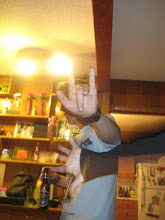Still Mommy’s Little Monsters
More than a quarter-century into their career, Social Distortion are still rattling skeletons
Social Distortion
I can only imagine that when the punk rock pioneers started punk rocking many moons ago, they weren’t thinking punk would ever evolve to this point (if they even thought far ahead at all). But when one of these punk rock pioneers answered the phone in Denmark the day before sharing a festival stage with Kanye West and the Pet Shop Boys, the “Well... how did we get here?” vibe is palpable.
“There was a time that this [amount of success] was completely unforeseeable,” says Social Distortion’s lead guitarist, Jonny Wickersham,. “I think that Black Flag was one of the first bands from our area to come tour in Europe, which was pretty gnarly, I’d imagine.”
Not that Social Distortion would rather run the festival circuit. “We’re playing these big huge festivals on these big stages — yeah, there is a huge crowd there, and it’s great, but they’re also, like, 20 or 30 feet away from the stage. It’s a really impersonal feeling most of the time. We’d much rather be in a 1,500-seater.”
Perhaps that literal distance from his fans is the best metaphor for how punk has changed. Like many of his contemporaries, Wickersham can’t help but feel a little estranged from the current scene. “[Punk rock] is completely different,” he notes without any hesitation. “It’s gone through so many cycles of change and levels of acceptance by the mainstream. It’s definitely a genre of music that’s important. That being said, it’s not the same thing anymore. In the late ’70s and early ’80s it was something really new and it’s not that anymore.”
Even something as simple as the meaning of the term “punk rocker” has gotten hazy — which makes it laughable to hear people getting so adamant about its definition. Wickersham seems just as confused as anybody taking the introductory class on “What Is Punk?” — and he’s one of the professors.
“I’m always curious when talking about punk rock,” he says. “What part of punk rock is important? Is it the sound? Is it because it’s guitar-driven music? Or is it the message that a particular band has? What is it? You don’t have to necessarily be playing a certain form of music to get the same message across, to get people to think and open their eyes. Punk is definitely a form of music, but there are people that play that music who don’t subscribe to the ideology at all.”
Perhaps Social Distortion’s eager investigation of other musical territories is the best example of how what you say, not how you say it is what matters in punk. Case in point: asked about rumours that the onetime angst-ridden youths are slowing down a bit and prepping an acoustic album, Wickersham admits that they’re definitely toying with idea. (Which isn’t surprising, considering Social Distortion’s lead singer Mike Ness’s two acclaimed forays into alt-country, Cheating at Solitaire and Under the Influences, both from 1999.)
Wickersham doesn’t see the idea of an acoustic album as genre-bending venture or an abandonment of the “scene.” “We’re not turning around every few years and completely changing the band,” he says. “It’s just an evolution — a natural growth. There are elements of the early Social D that are still there and there are elements of what this band was doing in the ’90s and then there’s elements of what we’re doing right now. The changing of opinions and tastes; you can’t just stay the same. It’s sad to hold on so tightly to a certain point of your life and try to keep doing that; you gotta grow.”


0 comments:
Post a Comment